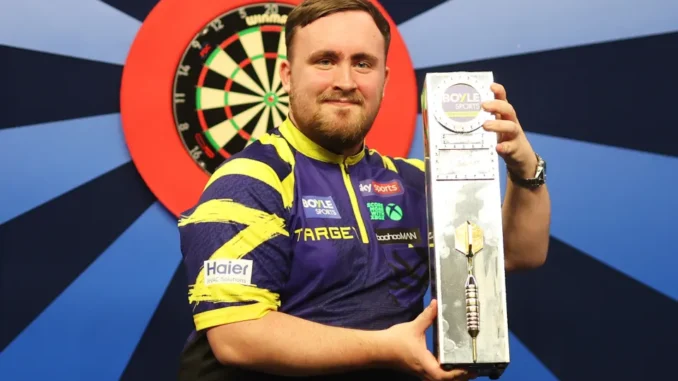
In the electrifying world of professional darts, where precision meets passion under the glare of arena lights, young sensation Luke Littler has once again proven why he’s the sport’s brightest rising star. At just 18 years old, Littler clinched a stunning victory at the World Grand Prix, defeating his formidable rival Luke Humphries in a commanding final that left fans on the edge of their seats. This triumph marked his seventh major title, a remarkable achievement for someone who burst onto the scene as a teenage prodigy and has since redefined what’s possible in the game.
The World Grand Prix, held in Leicester, is no ordinary tournament. Known for its unique double-start format—where players must begin and end each leg on a double—it demands an extra layer of skill and nerve. Littler, often called “The Nuke” for his explosive scoring power, navigated the competition with the poise of a veteran. He powered through a field of top-tier players, showcasing his trademark accuracy and unflappable demeanor. In the final against Humphries, the world number one, Littler dominated from the outset, hitting crucial doubles and building an insurmountable lead. The crowd erupted as he sealed the win, lifting the trophy amid cheers that echoed his rapid ascent from a Warrington local to a global icon.
But Littler’s story that night extended far beyond the oche. In a gesture that touched hearts across the sporting community, he directed a substantial charity donation to the Motor Neurone Disease (MND) Association following his victory. The initiative stemmed from the tournament’s sponsor, BoyleSports, who had pledged £20 for every double 20 hit throughout the event. Over the course of the week, players collectively struck the top double 404 times, generating £8,080. Recognizing the impact, BoyleSports generously boosted the total to £10,000, allowing the champion to select the beneficiary.
Littler didn’t hesitate. He chose the MND Association, an organization dedicated to supporting those affected by motor neurone diseases, including amyotrophic lateral sclerosis (ALS). These conditions progressively damage the nerves that control muscles, leading to severe mobility issues, speech difficulties, and, in many cases, a shortened lifespan. With no known cure, the association focuses on research, care, and advocacy to improve lives and push for breakthroughs.
Reflecting on his choice, Littler shared his gratitude and reasoning in a heartfelt post: “Want to thank Boyle Sports who pledged a donation of £20 for every double 20 hit during the World Grand Prix and boosted it to £10k for a charity of my choice. I chose MND Association and know how much it will mean to them.” The emoji of praying hands he added underscored the sincerity behind his words. This wasn’t a spur-of-the-moment decision; Littler has long been an advocate for the cause. As a devoted rugby league fan, he’s been inspired by the resilience shown in that sport’s community. He’s even worn the MND Association logo on his shirt during matches, a subtle but powerful show of solidarity.
Delving deeper into his motivations, Littler has spoken openly about the influence of rugby legends who’ve battled MND. “Being a rugby league fan I’ve seen the amazing fundraising work done for the Motor Neurone Disease Association, particularly by Rob Burrow and Kevin Sinfield in recent years,” he explained in a previous statement. Burrow, a former England and Leeds Rhinos star, passed away in 2024 after a courageous fight with the disease. His story captivated the nation, highlighting the brutal realities of MND while inspiring widespread support. Alongside him, his close friend and teammate Kevin Sinfield embarked on extraordinary challenges—running ultra-marathons and carrying Burrow across finish lines—to raise awareness and funds. Their efforts have amassed over £10 million, funding vital research and support services that offer hope to families facing similar diagnoses.
The ripple effects of such stories have extended beyond rugby. Just this month, another England rugby icon, Lewis Moody, revealed his own battle with MND. The former flanker, known for his tenacity on the pitch during England’s 2003 World Cup win, shared his diagnosis publicly, vowing to use his platform to advocate for better understanding and resources. These personal narratives resonate deeply with Littler, who sees parallels between the grit required in sports and the strength needed to confront such illnesses.
Littler’s contribution comes at a pivotal time. With his £10,000 donation, the MND Association can expand its efforts in providing specialist care, equipment loans, and emotional support to those diagnosed, as well as investing in cutting-edge research. For families grappling with the uncertainty of MND, gestures like this offer not just financial aid but a reminder that they’re not alone. Littler’s involvement amplifies the message, drawing in younger fans and bridging the worlds of darts and rugby in a shared mission.
This victory and subsequent act of kindness encapsulate what makes Littler special: raw talent paired with genuine humility. From his breakout performance at the World Darts Championship as a 16-year-old to this latest conquest, he’s shattered records and expectations. Yet, amid the accolades and prize money—Littler pocketed £120,000 for the win—he remains grounded, using his success to uplift others. As he prepares for upcoming tournaments like the Grand Slam of Darts, fans are eager to see what “The Nuke” does next, both on and off the board.
In an era where sports stars often dominate headlines for controversy, Littler’s story is a refreshing reminder of the positive impact athletes can have. His heartwarming decision after the World Grand Prix isn’t just about the money; it’s about empathy, inspiration, and knowing that a small act can mean the world to those in need. As Littler himself put it, he understands “how much it will mean to them,” and in doing so, he’s scored a bullseye for compassion.
Leave a Reply